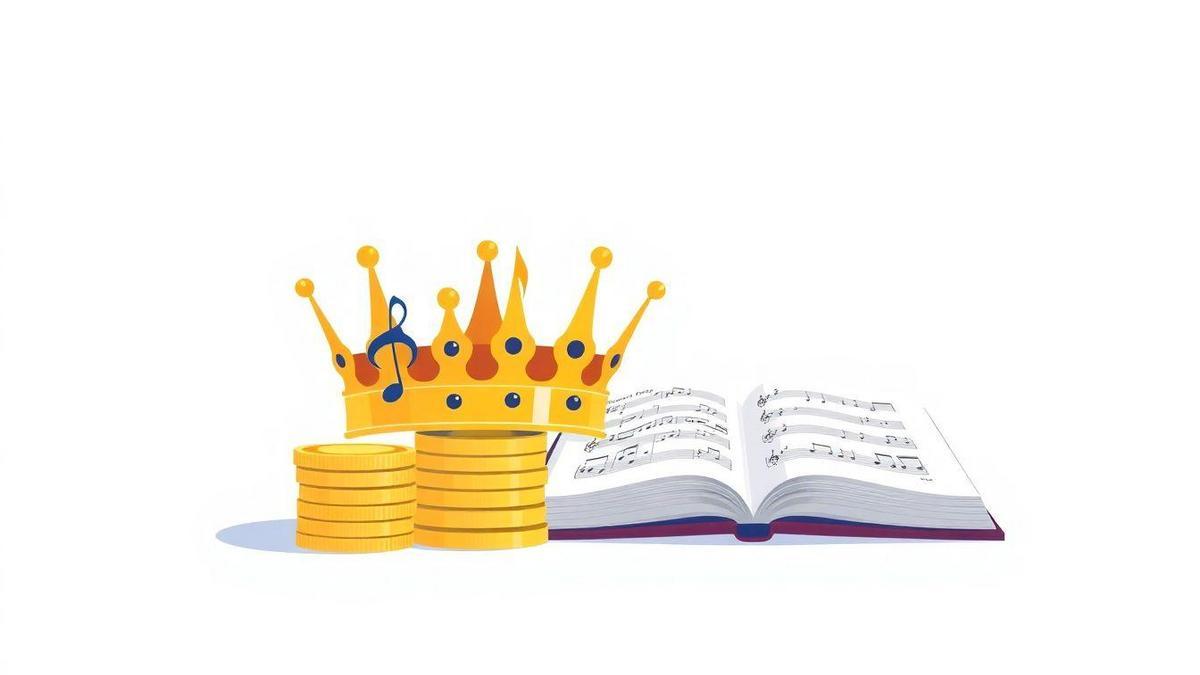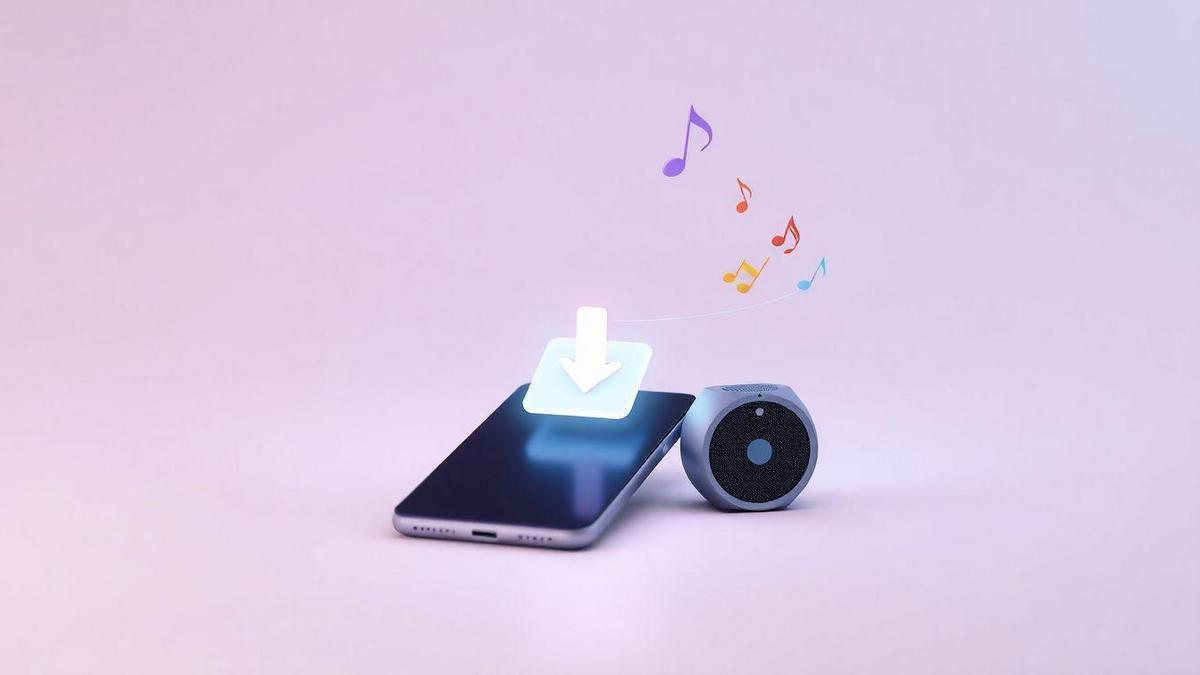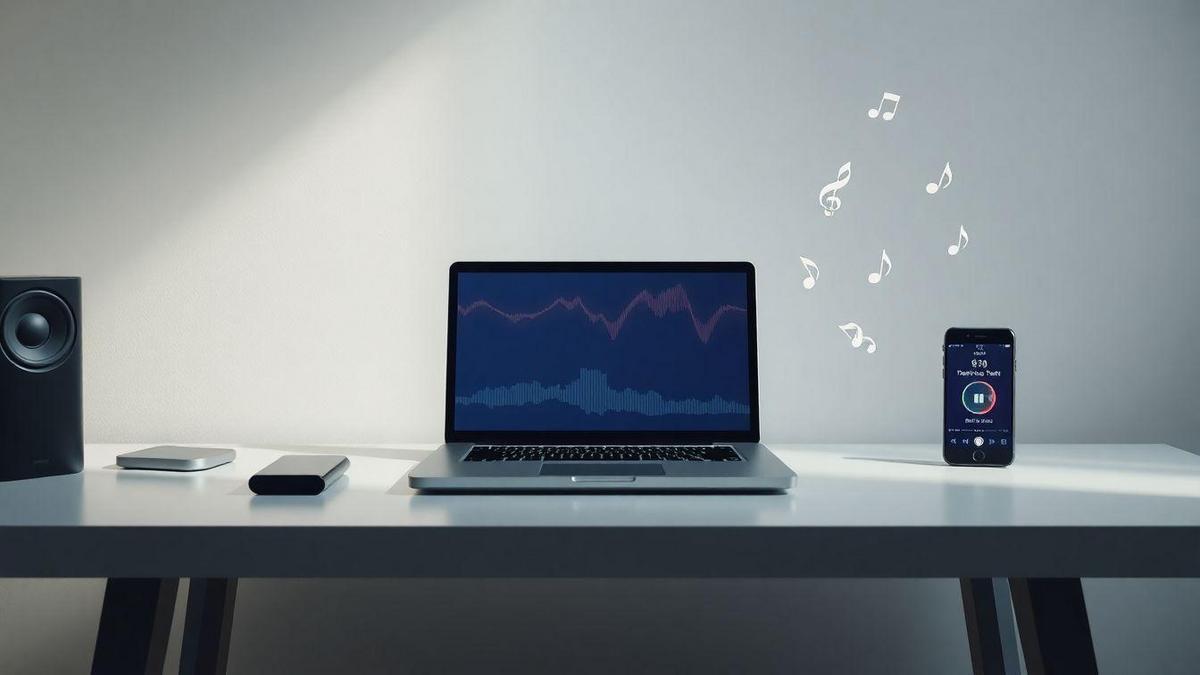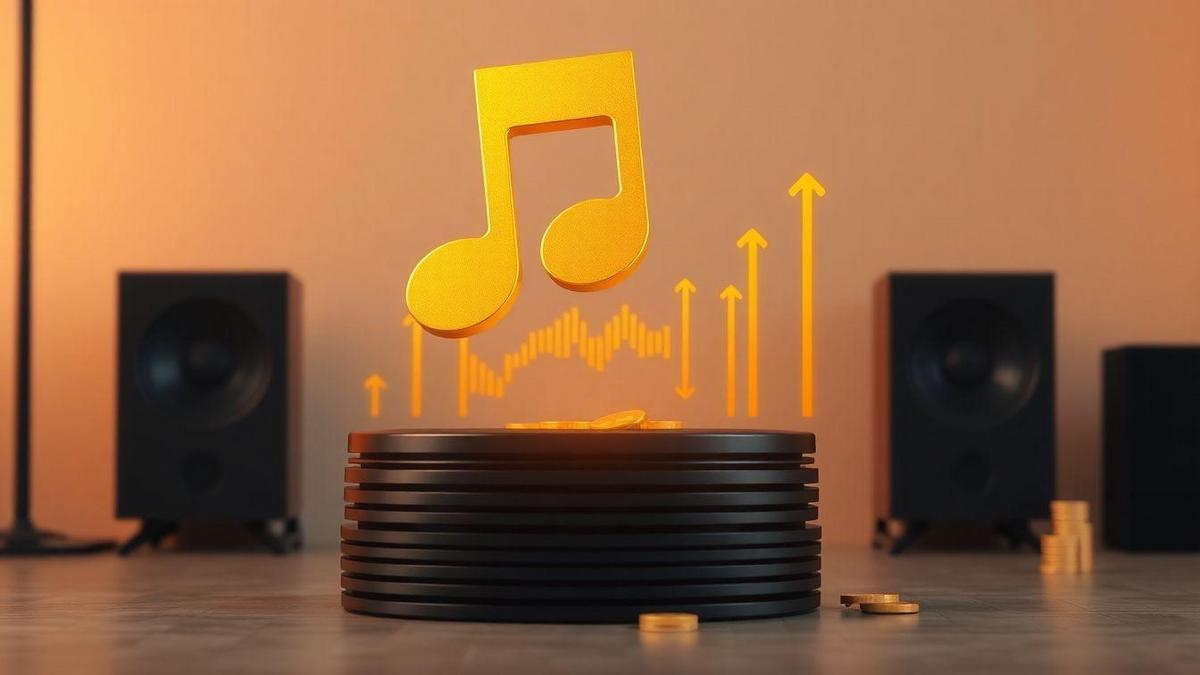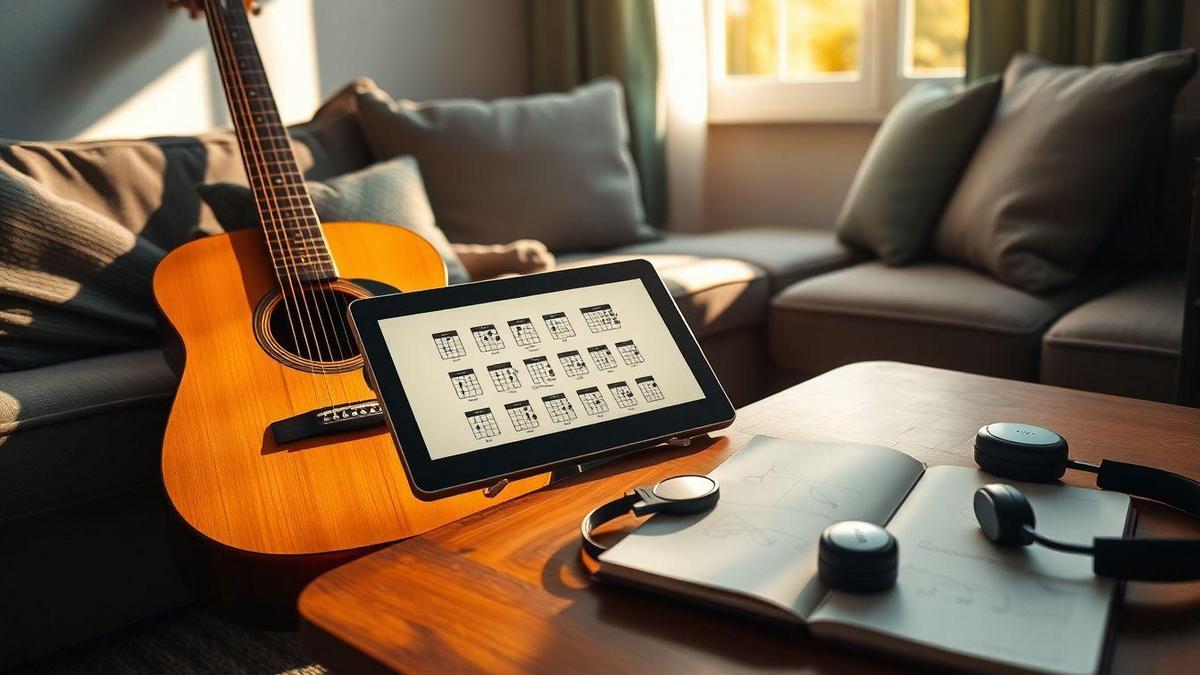Key takeaway
- Register songs to claim copyright.
- Join rights groups to collect royalties.
- Track plays and clean metadata to receive payments.
- Set clear splits so everyone gets paid.
- License music for TV, ads, and games to earn more.
Direitos autorais musicais — explained simply
I think of Direitos autorais musicais as a crown for a song: it identifies who created it and who controls its use. The law protects two core things: the musical composition (melody and lyrics) and the sound recording (the performance you hear). That protection stops others from copying, selling, or licensing your work without permission.
Who owns a song and what rights they hold
If you write melody and lyrics, you own the composition. If you record the performance, you usually own the master unless you sign it away. Co-writers share ownership; session players normally do not, unless they contributed to the writing.
Common rights:
- Reproduction: copy or record the song.
- Distribution: sell or share copies.
- Public performance: radio, live shows, streaming.
- Derivative works: adaptations or remixes.
- Synchronization: use in video, ads, games.
Labels and publishers often handle distribution and licensing and take a share in exchange. Whatever you assign or sell should be clear in writing — a handshake rarely holds up later.
Economic vs moral rights
Economic rights are about money and control: who can reproduce, sell, stream, or sync the work. They can be sold or licensed.
Moral rights are personal:
- Right of paternity — to be credited.
- Right of integrity — to object to changes that harm the work or your reputation.
In some countries moral rights can’t be fully waived. Even if you sell economic rights, moral rights may let you block offensive uses.
Why registro de direitos autorais musicais gives proof of ownership
A registro de direitos autorais musicais creates a dated record — a timestamped paper trail that strengthens your claim in disputes, negotiations, or court. It doesn’t create rights you don’t already have, but it makes enforcement much easier.
How to register (step by step)
- Save a dated master file (WAV), score, or lyric sheet; back it up in two places.
- Decide what to register: composition, recording, or both. Note co-writer splits before filing.
- Choose filing routes: national copyright office, a PRO for performance tracking, and optionally a private timestamp service. Keep receipts and confirmation emails.
- Track your submission: record certificate numbers and dates.
- Update registrations when splits change or a publisher joins.
Treat registro de direitos autorais musicais as planting a seed that grows into royalties.
Registration offices and online filing options
- Brazil: Biblioteca Nacional (Escritório de Direitos Autorais); ECAD for performance collection.
- USA: U.S. Copyright Office (eCO); SoundExchange for digital performance; ASCAP, BMI, SESAC for PROs.
- UK: PRS for Music (performance), MCPS (mechanical).
- France: SACEM; Argentina: SADAIC.
- Quick proof: Safe Creative or similar timestamp services.
- Distributors: TuneCore, DistroKid often offer publishing/collection add-ons.
Pick the combo that fits your career stage and territory.
Documents and metadata to submit
Provide:
- Title, clear description, writer names and contacts, publisher info, and split percentages.
- A copy of the work (WAV/MP3 PDF lyrics; sheet music as readable PDF).
- Dates of creation and first release, and identifiers (ISRC, ISWC, IPI/CAE).
- A signed ownership statement. Keep fee receipts and confirmations.
Keep dates and copies for gestão de royalties musicais
Keep originals, submitted files, screenshots of confirmations, emails, invoices, and certificates in a dedicated folder and cloud backup. Save amendments when splits change and copies of issued licenses. Good records make gestão de royalties musicais straightforward and prevent disputes.
Licenciamento musical: license types and who grants them
Licenciamento musical is permission to use a song without legal trouble. Main license types:
- Sync license — for video, film, ads, games (granted by publisher/writer). If using the original recording, you also need the master license from the label or owner.
- Mechanical license — for making copies (CDs, downloads, some streaming). Often charged as a statutory rate per copy or via licensing services.
- Public performance license — for radio, venues, broadcasts; handled by PROs.
Who grants licenses: writers and publishers control composition rights; labels/artists control masters; PROs manage public performance collections. Fees are set by statute, negotiation (sync/master), or blanket/tariff systems via PROs.
Clear licensing = better monetização de músicas
When rights are cleared, placements and broadcasts generate royalties. Register songs with PROs and keep metadata clean so payments flow. That’s monetização de músicas in practice: cleared rights, labeled correctly, money follows.
Setting up gestão de royalties musicais and collections that work
Map every income stream (live, radio, streaming, sync), match each to the rightsholder and split, and track metadata (names, ISRC, ISWC). Use a simple ledger to monitor inflows and outflows. Clean metadata and consistent submissions reduce orphan works and lost revenue. I treat Direitos autorais musicais with the same discipline I use for finances.
Performance Rights Organizations — how they collect and pay
PROs collect fees from venues, broadcasters, and some digital services, then distribute to writers and publishers based on registrations and reported plays. Register every song and claim exact shares. PROs use setlists, logs, and digital reports — if your song isn’t registered, you may not get paid.
How digital platforms report plays and payments
Platforms generate logs of streams and sometimes use Content ID to match usage. Reports feed DSPs, PROs, and distributors. Payments arrive monthly or quarterly and can lag. Fix metadata before release: misspellings or missing publisher details mean missed payments. Reconcile statements regularly and chase mismatches quickly.
Registering with a collecting society for administração de royalties para artistas
Register in the society that covers your market as both writer and publisher if possible. Upload songs with full splits and identifiers. Keep bank and contact info current and dispute missing payments promptly with evidence (release dates, screenshots, links). For international activity, use affiliates or a publisher with global reach.
Protecting songs and acting on infringement
Monitor proactively and act fast. I start with a calm message; often the infringing use is removed quickly. For U.S.-hosted sites, use DMCA takedown notices with clear ownership statements. Call a lawyer when use is commercial, sums are large, or the other party disputes ownership.
Monitoring unauthorized use
Use Google Alerts for titles, artist name, and key lyrics. Use Shazam or ACRCloud for audio matches. Enroll in Content ID on YouTube. Scan social media, fan pages, and local business playlists. Add subtle audio tags or consistent metadata to help prove ownership.
Takedown notices, DMCA basics, and when to get legal help
A DMCA notice identifies the work, URLs, and includes a statement under penalty of perjury. Platforms often provide templates. If a host ignores requests, or if the case risks career momentum or significant revenue, hire a lawyer. Always save screenshots, timestamps, and other proof before taking action.
Keep evidence for proteção de obras musicais and registro e licenciamento de músicas
Save session files, rough mixes, masters, emails, and timestamps. Keep demos emailed to yourself, cloud upload timestamps, and screenshots of infringements. Store licenses, split sheets, and contracts in one folder. These steps speed legal claims and clarify proteção de obras musicais, registro e licenciamento de músicas.
Maximize monetização de músicas with metadata and strategy
Treat each song like a business: clear title, songwriter credits, ISRC, release date, and publisher names. Plan release timing, pitch for playlists, and package tracks for sync. Accurate metadata answers platforms’ key question: who gets paid and how much?
ISRC, splits, and how metadata helps como receber royalties musicais
ISRC is the unique identifier for each recording; register one per track so plays and sales are tracked. Log splits before release and upload them to distributor and PRO accounts. Correct composer and publisher info prevents payment delays and disputes — it’s essential to receber royalties musicais.
Revenue sources
- Streaming: small per-play amounts — volume and playlists matter.
- Sync deals: often high one-off fees; keep stems and licenses ready.
- Direct sales: Bandcamp, website sales, limited physicals yield higher per-unit income.
- Merch: T-shirts, vinyl, posters — steady revenue, especially on tour.
Good administration and clear metadata make royalties easy
Centralize song data so distributor, PRO, and publisher all have the same info. Register ISRCs before release, upload splits to your PRO, and verify publisher details with stores. Automate collection where sensible, but keep active oversight. Consistent administration turns tiny coins into steady income.
Conclusion
Protect your music, organize the paperwork, and claim what’s yours. Register songs (registro de direitos autorais musicais), keep clean metadata, join PROs, set clear splits, and treat sync, mechanical, and performance licenses as contracts that open doors. Small administrative habits save big headaches and turn Direitos autorais musicais into real earnings.
Want to dive deeper? Read more at https://sambizangamusik.com.

